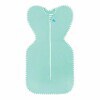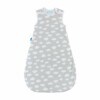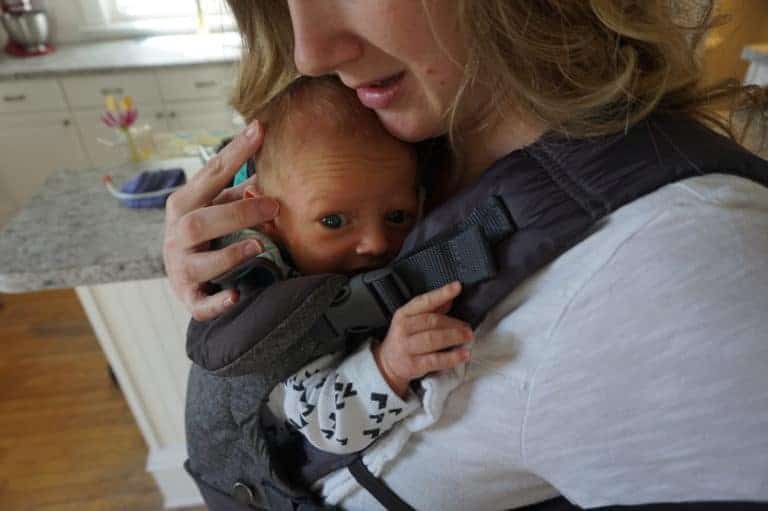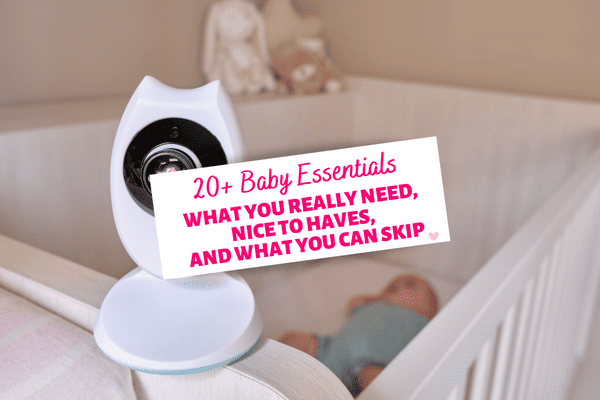How to Get Your Baby to Sleep (Baby Sleep Tips from Newborn to 6 Months)
Disclosure: This post may contain affiliate links, which means I may receive a small commission if you click a link and purchase something. Please check out my disclosure policy for more details. All opinions are my own!
How to help your baby sleep well in the first 6 months
This is a guest post written by Jilly Blankenship- pediatric nurse, lactation consultant and the creator of Baby Sleep Made Simple.
I love to sleep. In fact, it’s pretty much my obsession.
Working 12-hour night shifts as a pediatric nurse taught me how vital sleep is for physical and emotional health.
And also mental clarity.
They used to call me “the sleep guru” because I would poll each nurse on how many hours of sleep she got before her shift!
It wasn’t until I became a mom that I felt the devastating effects of chronic sleep deprivation.
My newborn slept pretty well (and so did I) because I was able to sleep when she slept. But around 4 months old, my baby stopped sleeping.
She started waking every hour, all night long, and refusing to nap more than 20 minutes.
We struggled through several months of broken sleep before I realized that something had to be done. We sleep trained our daughter at 7 months old and have never looked back.
I was so exuberant at how quickly I felt “normal” again that I decided I wanted to help other exhausted moms through this overwhelming time.
As a baby sleep consultant, I’ve found that knowing what you can realistically expect at each age helps reduce any worry or stress you may be feeling about your baby’s sleep.
So this guide helps you understand what you can reasonably expect from your baby during the first six months. And it gives you concrete tips to help your little one sleep well, at every age.


<— Don’t have time to read it all now? Pin it for later!
Your Newborn
The first months of motherhood are a challenging, yet beautiful period.
Maybe you’ve heard from some of your friends that your newborn baby will spend most of the time sleeping, eating and pooping.
That having a baby will feel like the most natural thing in the world for you.
Don’t worry if this isn’t the case for you.
Every woman experiences the newborn period differently. And a lot of that has to do with how easily her baby settles, sleeps and eats.
Your primary focus should be on your baby gaining weight and growing, and YOU getting the support and rest that you need.
Keep in close contact with your baby’s doctor to monitor growth. Nutrition takes priority over sleep at this point.
Once your baby is eating well and gaining weight, you can try to make some sense of sleep patterns.
Newborn sleep tips:
Your newborn won’t have consistent sleep patterns like older babies. He’s not developmentally ready for that just yet.
But there’s plenty you can do to help young baby settle and fall asleep.
- Newborns can’t handle being awake for long periods of
time. Your baby will want to sleep every 30 – 90 minutes, day and night.
- Short and unpredictable naps are common. It’s normal for your newborn to nap anywhere between 20 minutes to 2 hours.
- Your newborn will want to wake and feed every 2-4 hours, day and night. Ask your doctor how long your newborn can go between feeds.
- Bedtime for newborns is naturally late, usually 10 pm – midnight.
- Help your newborn learn the difference between night and day by having “active and normal” days and “quiet and dark” nights.
- During the day, keep the lights on and
curtains open. Allow normal household noises while your baby naps. Include your
newborn in your daily routine by taking her out for errands and walks.
- During the night, keep baby’s bedroom as dark as possible. Speak or sing softly to your baby
if he’s awake and unsettled during the night. Aim for less stimulation than
daytime. When baby wakes first change his diaper. Then put his swaddle blanket back
on. Finally, feed him in the dark so he can easily fall back to sleep.
- Have your newborn sleep in a swaddle blanket like the Miracle Blanket or Love to Dream. The cozy nature of a swaddle resembles the womb and prevents your baby’s startle reflex from waking him.


- Your baby should always sleep on his back, for day and night sleep. This reduces the risk of SIDS by 50%!
Your 6-12 week old
Your baby is growing by the day! You may see some sort of a loose daily routine forming at this point, but don’t worry if you don’t.
Social smiling appears at this age, which melts any mama’s heart.
Your little one is starting to interact with you and the outside world.
Along with big developmental changes, your baby’s sleep habits will change too.
6-12 week old sleep tips:
- Your baby needs to nap 1-2 hours after being awake. Sleeping often keeps your baby
from getting overstimulated, which can make it harder to settle for sleep.
- Your baby may take up to 5 naps a day. The amount of naps your baby
takes will vary depending on the length of her naps. Don’t let short naps stress you out! They’re completely normal at this age. What’s most important is that your baby naps often and seems happy between
sleeps.
- It’s way too early for baby to sleep through the night. Your baby needs
night feeds. Ask your doctor how long baby can go at night between feeds.
Most babies this age can get by with 2-3 night feeds.
- Your little one will sleep 8-10 hours at night (with waking to feed.)
- Bedtime typically falls between 8-10 pm.
- Your baby will sleep 14-18 hours each day. If your baby seems
well-rested and happy, there’s no need to keep track of her total
sleep hours.
- Start playing white noise at night to help your baby sleep deeply. It blocks environmental noises from waking your baby and is completely safe.
This is hands down, my favorite white noise machine – we have one for each of our kids!
- Black out your baby’s bedroom at night. Around this age your baby’s circadian rhythm starts to develop. Darkness encourages the brain to produce melatonin, the sleep hormone. This will help your baby start sleeping more at night and less during the day.
I recommend trying these blackout shades!
- If your baby is struggling with short naps or waking every hour at night, use a swaddle blanket. They can instantly help your little one sleep longer stretches. I recommend the Miracle Blanket and Love to Dream.
We used the Love to Dream Swaddle Up for our babes and it truly worked great!
- Fussiness can peak around 6 weeks old. Help your fussy (or colicky) baby relax by doing skin-to-skin, baby wearing, cluster feeding, going for a stroll outside, apply a warm tummy compress, massage your baby, or have a bath together.
Related: Tips to Combat Your Baby’s Evening Fussiness
Your 3 month old
Can you believe it?
Your baby is 3 months already and growing more each day.
Her skills are developing by the minute (it seems) and she’s starting to respond more to sounds and people. A little personality is shining through!
At 3-4 months old, sleep patterns can start to change. You should notice your little one sleeping more at night and less during the day. The circadian rhythm is getting established.
Some babies do this naturally, while others need help. This is a perfect age to start a more consistent sleep routine for your baby. You can do this by following the sleep tips below.
3 month old sleep tips:
- Daytime sleep is still a bit unpredictable. That’s to be expected. Your baby will have 3 – 5 naps each day, depending on
nap length. The number of naps your baby takes isn’t too important. It’s ok if one nap is 30 minutes and another nap 2 hours.
- What’s more important is making sure your baby naps often. Every 1-2 hours
to be exact. Babies this young can’t handle being awake for long periods of time. It can overstimulate
them, making sleep harder to achieve.
- Bedtime typically falls between 7:30-9 pm.
- Now is the time to start a bedtime routine, if you haven’t already. This is simply a series of activities that you do every
evening to help your baby relax and settle to sleep easily. Bathing, massaging,
reading books and singing lullabies are great example of calming activities
to include in your baby’s bedtime routine.
- If your baby struggles with naps, do a shortened version of your bedtime
routine before naps too.
Your 4 month old
Four months old is an age of big development and change. Your baby might be giggling, cooing, starting to roll over and grabbing everything.
Time to stop wearing dangle earrings and fancy necklaces!
This burst in development often coincides with major disruptions in your baby’s sleep. In fact, 4 months old is the most common age for parents to reach out to me for help with their baby’s sleep.
If you haven’t yet, you’ll soon hear about the 4 month sleep regression.
Sleep regressions are predictable disruptions in sleep caused by developmental milestones. As your little one advances in one area (like rolling) he might temporarily regress in another area (like sleep.)
Signs of the 4 month sleep regression include waking more at night, fighting falling asleep, taking short naps, and increased fussiness or restlessness.
Truth be told, it’s not the easiest time for many parents. What can help, though, is reminding yourself that it’s normal and it will pass.
The following tips will help your baby sleep well during this time.
4 month old sleep tips:
- Keep awake times at 1.5-2.5 hours. On average, your baby should nap
after 2 hours of being awake.
- The crib is the safest place for your baby to nap. But if your little
one is struggling (or you have errands to run) it’s ok to let baby nap in the carrier, stroller or swing. Just make sure
you supervise all naps.
- Most 4 month-olds sleep 9-11 hours at night. Very few will sleep 9-11
hours straight though. Most will need 1-2 night feeds.
- Your baby’s bedtime will probably fall between 7:30-9 pm. The exact bedtime that best suits your little one will depend on napping
patterns.
- If your baby is starting to roll, time to transition out of the swaddle and into a traditional sleep sack like the Zipadee Zip or Grobag.
I also love the Nested Bean Zen Sack if you’re looking for a similar wearable blanket for your baby!
- It’s also time to switch from a bassinet and into the crib, which gives
your little one the space to roll around safely and comfortably. Bumpers,
pillows, loose blankets and stuffed animals are unsafe and don’t belong in your baby’s crib.
- If you haven’t already, include white noise and a blacked out bedroom in your baby’s sleep space. These can instantly help your baby sleep deeper and longer!
Your 5 month old
Once your baby has passed through the big developmental phase that occurs at 3-4 months, sleep patterns change and become more “adult-like.”
This is the age where babies can learn to settle themselves to sleep.
When your baby can go into the crib awake, and fall asleep on her own, she’ll be able to resettle herself when she wakes at night and doesn’t have an overpowering need like hunger.
This is how you guide your baby to sleeping through the night- by teaching him or her to fall asleep without any help from you.
This is what sleep training is all about, and it’s why my sleep training program begins at 5 months old.
Your little one is now ready to be taught how to sleep better and longer.
5 month old sleep tips:
- Your baby’s bedtime is moving earlier and should fall between 7-8:30 pm.
- Most 5 month-olds sleep 9-11 hours overnight with 2-4 hours of napping
each day.
- Ask your doctor how many night feedings your baby still needs. Most
babies this age can get by with 1 or 2 night feeds.
- Your 5 month-old should have awake times of 1.5 – 2.5 hours and will probably take 3-4 naps each day.
- Begin sleep training! Start working on placing your baby in the crib
awake to fall asleep on his own. You can pat, rub, shush or sing to help him
settle to sleep. Each night lessen your direct
help, so your little one can take the lead and start sleeping longer stretches.
Your 6 month old
You’ve made it through the first half of your baby’s first year! (What many moms consider to be the hardest phase.) Well done!
Your little sweetie may now seem like a completely different baby than he was a few months ago.
He may be trying to sit up, crawl or talk. It’s a good idea to baby-proof your house at this point. Your little one will be “on the move” really soon!
During the first six months, we have to accept unpredictability with our baby’s sleep. Not any more, though!
It’s time to help your baby fall into a consistent sleep routine and the following tips will get you there.
6 month old sleep tips:
- As your baby gets older, he can handle being awake for longer
stretches. Your 6 month-old’s awake times should be 2-3 hours during the day.
- Total nap time should be 2-3 hours everyday. This is usually divided
between 2-4 naps.
- Your little one will settle into a bedtime between 6:30-8 pm and stay
there! This is the ideal bedtime for most children for the next few years.
- 11-12 hours night sleep can be expected at this age.
- At your baby’s next doctor appointment, ask how long he can go between night feeds.
Most pediatricians will recommend weaning off night feeds as long as your baby
is growing well.
- The best way to help your baby fall into a predictable daily routine is
to wake your baby at the same time each morning. This helps naps and bedtime
become more consistent too.
- Your baby is old enough for sleep training. This means you can work on
getting your baby falling asleep independently. When he can do this at bedtime,
he’ll also be able to resettle himself when he wakes at night. And next
comes sleeping through the night!
Getting Your Baby To Sleep Through The Night
If you’d like a step-by-step guide on getting your baby sleeping through the night, in a way that suits your baby’s temperament and your parenting style, check out my sleep training program here.
If there’s anything I want parents to know it’s this: No matter your baby’s age, temperament or your situation, you can always get your little one sleeping well.
Every family deserves to have restful sleep so they can enjoy these precious years.
The best way to help your baby sleep well is to first know what you can realistically expect at your baby’s age. Then work on setting up a consistent and age-appropriate sleep routine for your little one.
And finally, teach your baby to fall asleep independently at bedtime and for naps. This will lead to long, restful sleep for the long-term!
———-

Jilly is a pediatric nurse, lactation consultant and mom. Her passion is helping exhausted moms get their babies sleeping well so they can get their energy back, start feeling like themselves again, and enjoy these precious years with their children.
Her website BabySleepMadeSimple.com is filled with free resources and support for tired parents. She offers a free Exhausted Mom’s Survival Kit which walks parents through the first steps of sleep training.
Related: 13 Baby Sleep Tips & Hacks For New Parents
Related: 4 Tricks You Need to Be Using To Get Your Baby to Sleep
Related: How I Finally Got My Baby to Sleep on His Own
Recommended Products from this Baby Sleep Article













